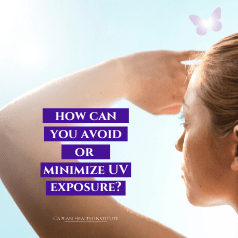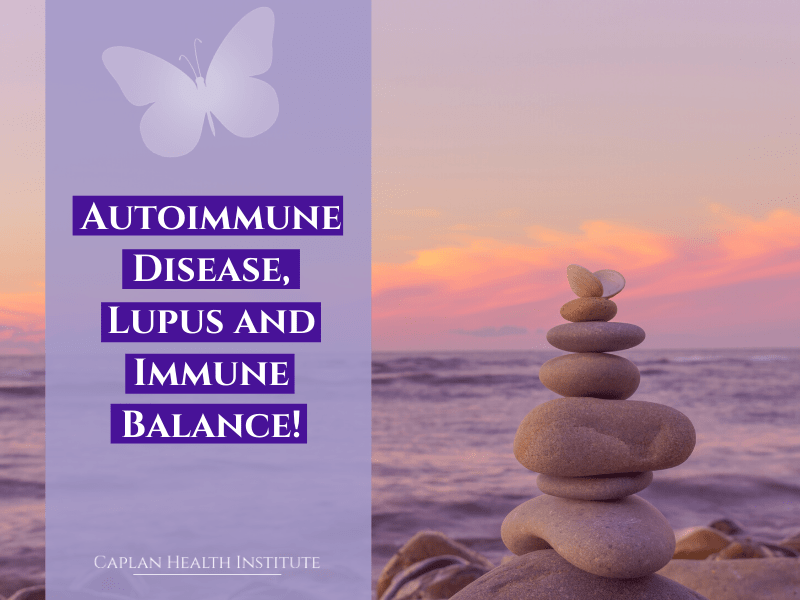Balancing the Immune System
Several contributing factors can trigger and perpetuate an autoimmune tendency within the immune system of lupus patients. But what is actually happening in the immune system itself to cause destruction of self-tissue and how can you achieve immune balance?
Just like all other systems in the body, it comes down to immune balance and the ability to self-regulate. These are the two primary factors with which the underlying causes are interfering.
Tissue destruction and acute infections cause the immune system to activate and stimulate the production of the immune cells necessary to react and clean up any inflammation that occurs. When this is a temporary issue, the immune system addresses the inflammatory response and then calms down and regains balance. But when the stimulus doesn’t go away or the immune system can’t keep up with its job, the inflammatory response doesn’t turn off. This causes chronic inflammation.
What Is Inflammation?
Inflammation is the body’s mechanism for “cleaning house.” On a cellular level, white blood cells increase in the area of the body that is having tissue destruction or an infection. These white blood cells essentially “eat up” the foreign invaders or the damaged tissues and clear them out into the lymphatics. If the immune system is effective at cleaning up all the damaged tissues or pathogens, the inflammation stops and the immune system falls back into balance.
Damaged cells and/or pathogens that don’t get cleared from the tissue by the immune system continue to release inflammatory chemicals to provoke inflammation to drive more and more white blood cells into that area.
Damaged Cells
When tissues are damaged or there is a foreign invader, such as a bacteria or virus, inflammatory chemicals are released in the tissue to signal the immune system to clean up the damage or toxins. The inflammatory chemicals that are released from damaged tissue or in response to pathogens stimulate the immune system. They act as a signal to call in the troops for battle. This is a normal and essential role of the immune system to protect us. But when inflammation doesn’t get turned off and the immune system is under constant demand, the troops start to dwindle and the body has a harder and harder time solving this issue, allowing for the problem to not only continue but sometimes exacerbate, leading to an imbalance in the functioning of the immune system.
If your body has too much going on for the immune system to handle this, then inflammation continues and leads to more stress on the immune system as it tries to get rid of the bad things and restore normal function. Again, inflammation is not the bad guy. It is a healing mechanism in the body and essential for normal healing and repair, but too much of a good thing is never a good thing, and when inflammation is left unchecked and becomes chronic, it causes damage.
The Delicate Balancing Act of Immune Balance
For simplicity’s sake, let’s picture the immune system like a balancing scale where both sides should balance out equally. The two sides of the scale represent the different types of immune cells being produced. Although many, many more cells are actually involved, for the sake of this explanation, we are going to keep it simple by using Th1 (T helper 1) and Th2 (T helper 2) and Treg (T regulatory cell) to represent the cells of the immune system.
When something inflammatory happens, the immune system is called into action and will temporarily shift focus toward one side of the scale. Your immune system has two parts that each work in different ways: your innate immune system and your acquired immune system.
Innate immune system
Your innate immune system is built to quickly handle and fight off any potentially harmful foreign invaders or substances, whereas your acquired immune system creates “memory cells” to aid in remembering those harmful substances it comes across to better fight them off next time. For example, if you get chicken pox, your innate immune system will recognize that virus as something that is not supposed to be there and cause an attack against it. At the same time, your acquired immune system starts to create antibodies to remember this virus so if it ever encounters it again. If you get exposed to it in the future, your immune system will remember how to fight it off so you don’t end up with chickenpox or shingles. Vaccines work to simulate or stimulate an acquired immunity for the same reason.
Food and Nutrition for Immune Balance
A great place to start when it comes to maintaining food and immune system balance for those suffering from lupus is to remove inflammatory and potentially immune-stimulatory foods from the diet. Following an elimination diet or an autoimmune paleo protocol can assist in this process. These simple dietary changes can make a positive impact on your immune system’s ability to function well and can help support immune balance. You can read more on this and other topics on our blog page.
Some Helpful Lifestyle Tips
- Smoking or vaping nicotine is toxic. These habits lead to increased inflammation, oxidative stress, and immune system irritation.
- Incorporate regular, consistent exercise into your life, but make sure not to overdo it. Overly strenuous exercise can perpetuate leaky gut and contribute to stress in the body.
- Incorporate daily stress management techniques. Daily stress management is crucial for both healing and maintaining remission. Chronic stress is pro-inflammatory, meaning it contributes to immune system overactivation and leads to flares of the disease. Considering this, you should make it a priority in your life to learn how to cope with stress and avoid as many external stressors as possible.
- Get plenty of sleep. Sleep deprivation can elevate inflammation and cause further damage to your immune system.
Photosensitivity
Sensitivity to the sun can be devastating for those struggling with lupus. It can be exhausting to have to plan your day around avoiding the sun or suffer the consequences. The sun’s UV rays can cause skin damage and trigger an immune flare-up and symptoms. In sun-sensitive individuals, sun exposure can mean painful sunburns, rashes, aches and pains, and fatigue even after short stints in the sun.
How can you avoid/minimize UV exposure for Immune Balance?

- Cover up! Wear a hat, long sleeves, an umbrella, and gloves.
- Avoid the sun between 11am-30pm when the sun’s rays are the strongest.
- Use a daily natural broad-spectrum sunscreen on all exposed skin.
- Be aware of the effects of indoor lighting as indoor fluorescent lights can also create problems in some sensitive people. Don’t be afraid to discuss lighting options, etc. with your employer.
- Be aware of things that may increase your sensitivity to the sun.
Things that may increase your sensitivity to the sun:
- Certain drugs can contribute to or increase photosensitivity, such as certain antifungal drugs, antihistamines, oral contraceptives, non-steroidal anti-inflammatory drugs (NSAIDs like ibuprofen and naproxen), antibiotics, oral diabetes drugs, diuretics, and tricyclic antidepressants. The same is true of the herbal remedy St. John’s wort, which is taken for depression, anxiety, and PMS.
- Consuming foods like celery, dill, fennel, figs, lime, parsley, and wild carrots can increase sun sensitivity.
- Topical scents and essential oils like bergamot, bitter orange, lavender, lemon verbena, musk, rosemary, and sandalwood can make your skin more reactive to the sun.
- Check skin care products for ingredients such as glycolic acid, salicylic acid, and Retin-A. Each of these agents strips the outer layer of the skin. They make the skin more sensitive to the sun. Plus, the chemical benzoyl peroxide, which is in many over-the-counter acne products, can cause photosensitivity.
Supplements
The supplemental herb Polypodium leucotomos may help with skin protection to reduce symptoms or flares with sun exposure. This plant extract has been shown to protect against free radical damage in the skin like what can occur from UV exposure.
It is vitally important for sun-sensitive people to supplement with oral vitamin D to ensure adequate amounts for immune support and immune balance. Vitamin D is arguably the most important vitamin for those with autoimmune disease. Most people – with or without autoimmune issues – are deficient. They do not get enough vitamin D from their diet or lifestyle to help support the very important role it plays when it comes to health.
Here are 3 tips to support your circadian rhythm
Electronics
- Stop indulging in electronics late in the evening. We need to quiet our minds in the evening, so it can do its job and let us float off into sleep. Modern electronics like TV, computers, and smartphones certainly do not help, beeping and ringing sometimes all night. On top of the sounds and distraction, our brains have evolved to produce the sleep hormone in response to darkness. This allows us to naturally feel sleepy after sunset, and wake at or near sunrise. The light in our electronic screens greatly disrupts melatonin production.
Sleep
- The next easy solution is resting or sleeping in your bed in your bedroom. Falling asleep in front of the TV or on your couch is simply poor sleep hygiene. It’s terrible for your body and your health. And make sure your mattress and pillows are super comfortable and great for your body. An uncomfortable pillow can ruin your night – and your day!
Sunlight
-
Morning Sunlight. Get out and be in the daylight as soon as possible after you wake up each morning. Morning sunlight has a bigger effect on sleep than almost any other variable. In the morning, if we get bright light exposure, our brain turns on a timer. It says, okay, 14 hours after this is time to sleep, and you’re ready to have a good deep refreshing sleep cycle after you start that whole process. The magic number seems to be about a half an hour of exposure within an hour of waking. Just being outside, even if it’s overcast or anything, there’s so much more light intensity. (One pitfall is just living in areas or at times of year – or lifestyles – where you’re just not getting up with the daylight. In those cases, it’s worth having a lightbox. You can get units from Amazon in the $100 price range.)
One of the fastest ways to restore health and help you feel better almost immediately is to get more sleep. In fact, it is also one of the simplest keys to unlocking more energy.
And it is an easy entry point to health – and happiness.
Healthy Regards,
Dr. Tiffany Caplan & Dr. Brent Caplan
PS: Have fun exploring the creative and flavorful recipes in Dr. Caplan’s cookbook “Lupus Friendly Recipes to Calm the Fires of Inflammation.” These delicious recipes are great support for lowering inflammation due to lupus or other autoimmune disease symptoms.
PPS: Self-care is so important, and an essential component of conquering autoimmune disease. This is why my wife; Tiffany and I created the “Simple Self Care for Autoimmunity” e-book. This guide provides 8 simple and effective ways to practice self-care you can start today! It’s our gift to you! Download it now at no cost!




Leave a Reply